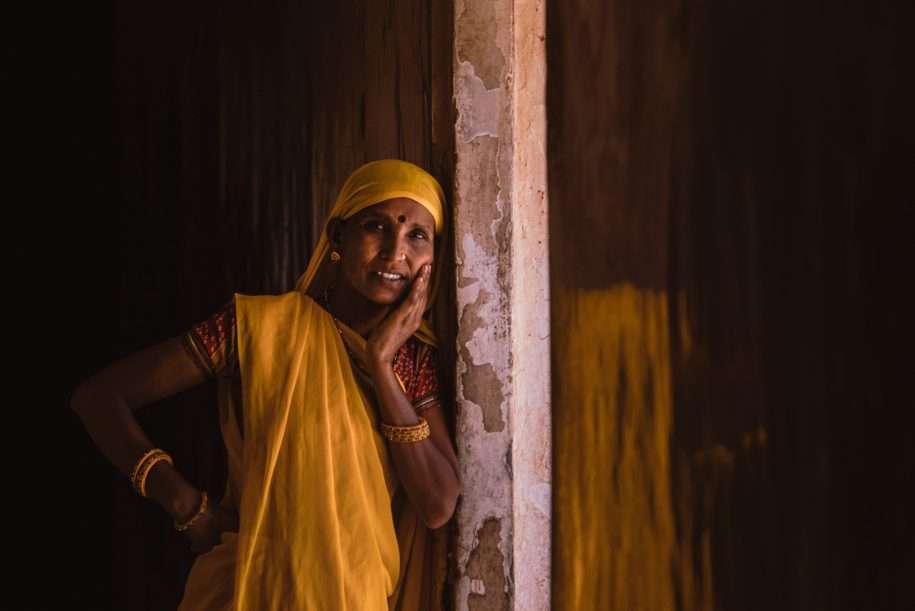 |
| Picture Credit: http://www.openthemagazine.com/ |
Shanti’s Savings Story – Moving from Informal Finance to Formal Finance

By LEAD Research Team
My name is Shanti and I live in 15 kms outside Varanasi. I have a small family with 3 children – Ruby who is 8, Rahul who is 7, and Rishu who is 1.5 years of age. My husband Kisna, is a Rickshaw puller, and I work in the neighborhood cleaning houses. Our total household income is around Rs. 6,000 per month as we struggle to make our ends meet. Six months ago a lovely madam, named Rita Madam came from an NGO and told us about the importance of saving – little by little, and sooner than later. Rita Madam gave us other useful advice about what savings products exist for low-income families like ours, who do not have easy access to banks in the area; now I am finally on my way to managing my money better.
Nearly 6 months ago, I used to feel overwhelmed when trying to save because there was no secure place to save at home as my husband would dip in the piggy bank I had at home, my relatives nearby would ask for the money I saved at home, and whatever was left over got spent on things the kids want or things I like such as ornaments, festivals, beauty supplies. I tried to save a little everyday though, may be Rs. 5 – Rs. 10 a day, but no Bank was willing to take my small deposits. I also needed to be able to withdraw these savings for larger household expenses – sometimes for emergencies, sometimes for weddings, festivals and sometimes for investing in the rickshaw or home repairs.
With little savings at home, and limited access to banks, we had to pawn our bicycle for Rs. 500 for Rahul’s medical expenses a few months ago. We did not want to go to the local Sahukar (moneylender) because he charges a very high interest rate – nearly Rs. 40 for every Rs. 100 borrowed.
But the Rita Madam showed us helpful ways to save, and we are more disciplined about savings now. She told Kisna to join the Rickshaw ROSCA (Rotating Savings and Credit Association) that already had 13 members. In this ROSCA, each member saves Rs. 20 per day and put it in a savings pot, and 1 person withdraws the money each day. Kisna already knew some of the people in the ROSCA and they welcomed him with open arms. Kisna deposited Rs. 20 each day, and then when his turn came, he received INR 280, which we were able to use towards Rahul’s medical care. Now, we are saving for our children’s education through the ROSCA. The commitment to save Rs. 20 each day has helped Kisna cut back on his wasteful expenditures such as Chai, Samosas and Bidi.
My sister Radha, who lives nearby is also a part of small savings groups, which is run by the local women in the area. She pays the deposit collector Rs. 10 every day for 1 month, but the collector takes Rs. 10 for every Rs. 100 that Radha saves. I thought of joining the group too, but Rita Madam said that Radha not earning on her investment, but losing money on it by as much as 10% saved for the entire year. But what to do, which Bank will take our small deposits and let women like us withdraw large amounts of money when needed?
Instead, Rita Madam also told me about a group of women who save together and support each other during time of financial need. They call this a Self Help Group, which is run only by 10 women in the neighboring village. I just joined this group 2 weeks ago, and we have regular weekly meetings; there is a group leader who guides us and writes down all of our deposit information. We save a fixed amount of Rs. 100 each week and once we will have collected Rs. 10,000, we will be able to lend to various members of the group. Our group leader told us that we all have to be disciplined about saving and paying our loans back. If we do well as a group, we may also get bigger loans from the Banks. I am now saving for my children’s education, and then someday I hope to take a loan for my daughter’s marriage from the bank at a low interest compared to the “sahukar”.
Maybe the time has come for me to take charge of my own financial future and manage my money better…then one day, just like Rita Madam, I too will be able to help my friends and family save more and worry less.




